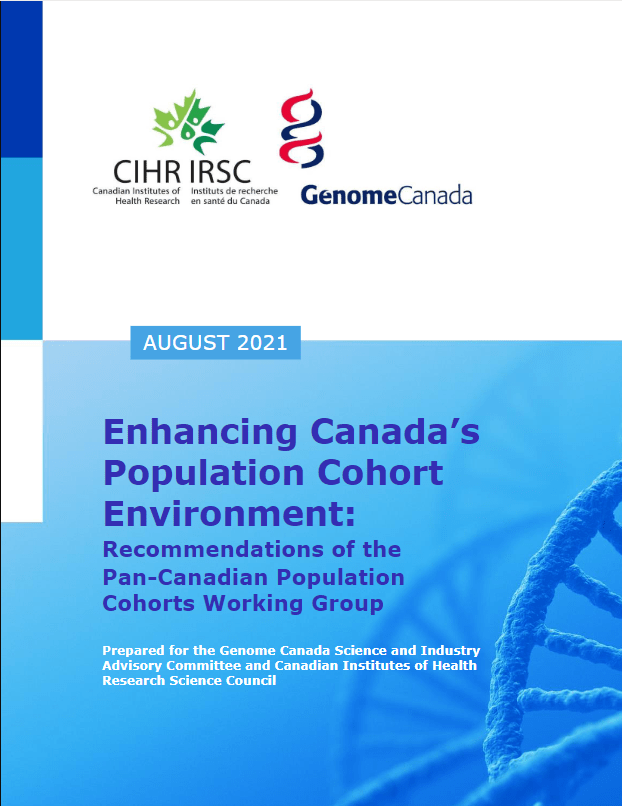Ottawa, ON
A national approach to large-scale inclusive datasets can enable precision health to improve health outcomes and health systems to drive life sciences innovation in Canada.
Today, Genome Canada and the Canadian Institutes of Health Research (CIHR) released a joint report, Enhancing Canada’s Population Cohort Environment, with 11 recommendations to strengthen Canada’s health data and research outcomes and drive greater benefits for those who live in Canada.
Genome Canada and CIHR led a dialogue on the status of population cohorts across the country resulting in this new report. Population cohorts are defined population groups selected for longitudinal assessment to gain insight into factors that influence health and are a critical component of learning health systems.
Canada currently funds several large population cohort studies, but they are siloed and unconnected, with key gaps. The dialogue, which engaged Canadian and international leaders in data and cohort management as well as citizens and data organizations, examined these system-level gaps that are hindering full value realization from these investments. These include barriers to administrative data access; lack of representation of Canada’s diverse population; a deficit of Indigenous-led cohorts; challenges with data sharing and harmonization; lack of sustainable funding; and low public awareness. The new report outlines 11 recommendations to improve and optimize population cohorts so they can become even greater resources for actionable insights and improved health outcomes for all who live in Canada. As one next step, Genome Canada is now mapping a comprehensive catalogue of Canadian genomics cohorts and biobanks.
Many countries, such as the United Kingdom and the United States, are making major investments in national health databanks and large-scale cohorts to drive precision health care and innovation. Generating and coordinating large-scale, diverse health and genomics data initiatives can accelerate precision healthcare in Canada and drive significant innovation in the sector.
Putting the report’s recommendations into action will take coordinated pan-Canadian effort and an ecosystem approach from Canada’s genomics and health research funders and many other partners. Building on this report, and models and lessons learned from our COVID-19 response, Canada now has an opportunity to build and invest in a bold vision for developing and coordinating large-scale inclusive Canadian datasets to drive the future of health and life sciences innovation in this country.
Working Group members | Key recommendations | Download the report
Pan-Canadian Cohorts Working Group members
Co-chairs
Fiona Brinkman
Distinguished Professor, FRSC, Department of Molecular Biology and Biochemistry
Associate Member, School of Computing Science and Faculty of Health Sciences
Simon Fraser University
Marc Gunter
Section Head, Nutrition and Metabolism Section
International Agency for Research on Cancer, World Health Organization
Working group
Rodrigo Arancibia
Director, Life Sciences Industries Directorate
Innovation, Science and Economic Development Canada
Guillaume Bourque
Professor, Department of Human Genetics
Director of Bioinformatics, McGill Genome Centre McGill University
Alysha Croker
Director, Centre for Policy,
Pediatrics and International Collaboration
Health Products and Food Branch
Health Canada
Jonathan Dewar
Director General & Vice President
Collections, Research, Exhibitions, and Repatriation
Canadian Museum of History
Federica Di Palma
Chief Scientific Officer and Vice-President, Sectors
Genome British Columbia
Brent Diverty
Vice-President, Programs
Canadian Institute for Health Information
Rick Glazier
Scientist, Li Ka Shing Knowledge Institute, St. Michael’s Hospital
Scientific Director, CIHR Institute of Health Services and Policy Research
Tina Hambuch
Global Lead Laboratory Director
Invitae Corporation
Peter Hutchinson
Indigenous Public and Population Health Consultant
University of Saskatchewan, College of Medicine, Morning Star Lab
Simon Lambert
Executive Director, NEIHR National Coordinating Centre
Associate Professor, Indigenous Studies, University of Saskatchewan
Jeff Latimer
Director General and Strategic Advisor for Health Data
Statistics Canada
David Lee
Chief Regulatory Officer
Health Canada
Mark Leggott
Director, International Relations
Digital Research Alliance of Canada
Alies Maybee
Patient Partner
Co-founder, Patient Advisors Network
Kimberlyn McGrail
Scientific Director, SPOR Canadian Data Platform
Scientific Director, Population Data BC
Director of Research, UBC Health
Professor, UBC School of Population and Public Health
Chris McMaster
Professor, Department of Pediatrics, University of Dalhousie
Scientific Director, CIHR Institute of Genetics
Verena Menec
Professor, Faculty of Health Sciences
University of Manitoba
Dan Roden
Professor, Medicine and Pharmacology and Biomedical Informatics
Vanderbilt University Medical Center
Nicholas Timpson
Professor of Genetic Epidemiology
PI Avon Longitudinal Study of Parents and Children
MRC Integrative Epidemiology Unit
Bristol Medical School (PHS), University of Bristol
Wyeth Wasserman
Senior Scientist, Centre for Molecular Medicine and Therapeutics
Investigator, BC Children’s Hospital Research Institute
Professor, Department of Medical Genetics, Faculty of Medicine
The University of British Columbia
Christine Williams
Executive Vice-President and Head of Implementation Science
Ontario Institute for Cancer Research
Michele Wood
Kaujisaktik/Kimiggutik (Researcher/Evaluator)
Nunatsiavut Government
Ma’n Zawati
Executive Director, Centre of Genomics and Policy
Assistant Professor, Faculty of Medicine, McGill University
Key recommendations of the report
- Increase the diversity of participants across Canada’s cohort landscape to deliver more equitable outputs that are beneficial to all.
- Facilitate self-determination efforts of First Nations, Inuit and Métis populations to realize each of their cohort ambitions in alignment with established data strategies and principles, and partnership expectations.
- Enhance Canada’s cohort landscape with an intention to enable new research, healthcare, wellness and economic paradigms.
- Enhance and harmonize existing cohorts while evaluating the need for any additional cohorts to fill remaining gaps across the portfolio.
- Set, and support and incentivize adherence to, common data standards according to FAIR, CARE and TRUST principles that foster interoperability and data sharing within a federated data model and operate under ethical governance frameworks.
- Establish or expand upon trusted research platforms that bring together data, integrate analytical tools and capabilities and draw information from administrative systems.
- Establish a Coordinating Body with diverse membership, suitable governance structures and appropriate authority, respecting First Nations, Inuit and Métis relationships with Federal/Provincial/Territorial governments, in order to set a unifying vision, prioritize strategic objectives and translate the WG’s recommendations into tailored action plans.
- Conduct a more detailed landscape assessment to fully understand existing assets and gaps in the cohort landscape to inform specific action plans and deliver on recommendations.
- Engage with and involve the public, potentially in collaboration with other data-related initiatives (e.g., pan-Canadian Health Data Strategy, Indigenous data strategies), to understand expectations, build momentum and foster trust.
- Formulate strategies and approaches, and work with complementary initiatives to address systemic, jurisdictional barriers around data sharing, administrative data linkages, privacy and risk.
- Secure sufficient, long-term financial commitments by communicating the value and impact of an enhanced cohort landscape in alignment with policymakers’ priorities.
ENGAGING CANADA'S POPULATION COHORT ENVIRONMENT
This report summarizes the results of a pan-Canadian dialogue, led by Genome Canada and the Canadian Institutes of Health Research, on the status of pan-Canadian population cohorts in Canada. It outlines 11 recommendations for optimizing the collection and use of social, economic, environmental, healthcare, lifestyle and human biological data as a resource for actionable insights and improved health and wellness for those who live in Canada.

